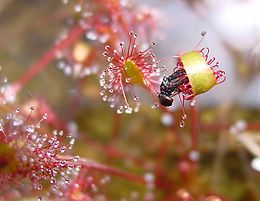
Back هلام نباتي Arabic Mucílagu AST Mucílag Catalan Schleimstoffe German Mucilago Esperanto Mucílago Spanish Muzilago Basque لیزاب Persian Mucilage French Mucilaxe Galician

Mucilage is a thick gluey substance produced by nearly all plants and some microorganisms. These microorganisms include protists which use it for their locomotion. The direction of their movement is always opposite to that of the secretion of mucilage.[1] It is a polar glycoprotein and an exopolysaccharide. Mucilage in plants plays a role in the storage of water and food, seed germination, and thickening membranes. Cacti (and other succulents) and flax seeds are especially rich sources of mucilage.[2]
- ^ "Modes of Locomotion in Protists: 5 Modes". Biology Discussion. 6 September 2016. Archived from the original on 24 December 2017. Retrieved 26 October 2017.
- ^ "Mucilage cell, cactus". www.sbs.utexas.edu. Archived from the original on 15 June 2017. Retrieved 26 October 2017.
© MMXXIII Rich X Search. We shall prevail. All rights reserved. Rich X Search